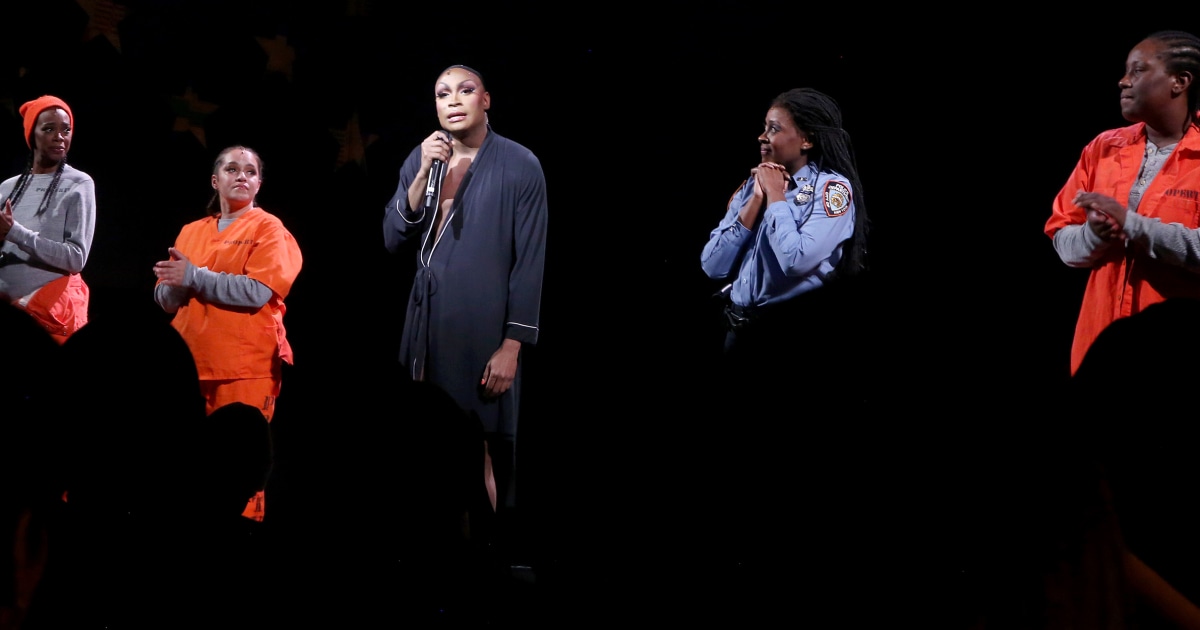
Broadway play “Ain’t No Mo’” has been extended to Dec. 23 after its cast and fans mobilized online support to prevent the show from closing just two weeks after its debut at the Belasco Theatre.
The #SaveAintNoMo campaign began once cast and crew learned the play would end production on Dec. 18 instead of the initially planned Broadway run, which was scheduled through March.
The comedy described as a blend of “sketch, satire, avant garde theater, and a dose of drag” imagines what would ensue if the U.S. government offered the descendants of enslaved Black people a one-way ticket to Africa, according to the play’s website.
Playwright and star Jordan E. Cooper, the youngest Black American playwright on Broadway, took to social media to plead for the public’s help in resisting the “eviction notice” and to #SaveAintNoMo: “in the name of every story telling ancestor who ever graced a Broadway stage or was told they never could, PLEASE SUPPORT THIS PRODUCTION.”
As word quickly spread of the play’s impending end, the hashtag circulated through social media. Passionate fans and theater newcomers alike galvanized the public to fill the seats.
“Industry” and “Bodies Bodies Bodies” actress Myha’la Herrold advocated for the play on Instagram, praising it as “very fun and very queer and very VERY Black.”
“They deserve better, the people who haven’t had the chance to witness this greatness deserve better,” Herrold wrote.
Celebrities including Jada Pinkett-Smith and Will Smith, Tyler Perry, Gabrielle Union and Dwyane Wade, Shonda Rhimes, and Sara Ramirez all bought out performances of the show, according to Cooper’s Instagram account. Other public figures including the Rev. Al Sharpton and Swizz Beatz made donations to keep the curtains up, according to Deadline. The show’s producer, Lee Daniels, also tapped into a network of Black celebrities and creatives to amplify the campaign’s message.
While the campaign has gained a win, the battle is far from over.
“We are still fighting,” Cooper wrote in an Instagram post.
Cooper said he is no stranger to hustling and operating in survival mode, as someone who has been putting on plays since the age of 2. When the young playwright moved to New York City, he would often stand in Times Square, handing out promotional flyers for his plays. But Cooper said he did not expect to continue hustling even after breaking onto a Broadway stage.
“It’s so admirable for him to step out and have a voice so that his show survives … [but] he shouldn’t have to,” said Drew Shade, founder of Broadway Black, a site that documents and highlights Black achievements in theater.
The traditional decision-makers around Broadway’s financing and marketing “don’t know what to do with your type of audience,” Cooper said.
The woes for “Ain’t No Mo’” follow the announcement that “KPOP,” the first Broadway musical to tell a Korean story, closed its curtains two weeks after opening.
“The fact that ‘Ain’t No Mo’’ is closing within a week of ‘KPOP’ just shows how little regard that this system has for us and how so much of the audiences that they try to represent regards our stories,” “KPOP” actor Abraham Lin said on Instagram. “Our stories are not niche.”
Cooper said “Ain’t No Mo’” was not given a fair shot to establish an audience. “There was no billboards in these Black neighborhoods where people could know that the play is for them,” Cooper said.
“I’m trying to make a Broadway theater look like an HBCU homecoming,” he said.
Douglas Lyons, whose play “Chicken & Biscuits” debuted in 2021, noted that there has been an increase in productions featuring stories by and about Black people on Broadway, which he described as traditionally being “a predominantly white space.” Nonetheless, he added, “the audiences aren’t going to change overnight.”
“There has been motion and effort from the Broadway community and theater owners and producers to bring the work in, there’s just not historically an infrastructure for the audience to feel like they’re welcome into that space,” Lyons said.
When plays such as “Ain’t No Mo’” struggle to fill seats, Shade, of Broadway Black, said the blame is cast onto Black people for not attending. Low box-office numbers can further deter investment in Black plays.
There is a myth that Black people don’t come to the theater, Shade said.
“If you welcome them, they come. But I been doing this for 10 years and I sometimes still don’t feel welcomed in the theater,” Shade continued.
“Ain’t No Mo’” is a freedom space, Cooper said. Unlike the other Broadway productions he said he has witnessed, audience members can express themselves without restraint and exist in a community that collaborates to bring the play to life.
While the future of the Broadway run of “Ain’t No Mo’” remains uncertain, what is clear to Cooper is the legacy that #SaveAintNoMo is creating for future marginalized playwrights.
“It’s so much bigger than ‘Ain’t No Mo,’” he said. “We have to prove the point that shows like this have an audience. Hopefully the next person who comes up behind me doesn’t have to campaign for their work.”
“We have so much more power than we think we have.”
Follow NBCBLK on Facebook, Twitter and Instagram.
Source: | This article originally belongs to Nbcnews.com










